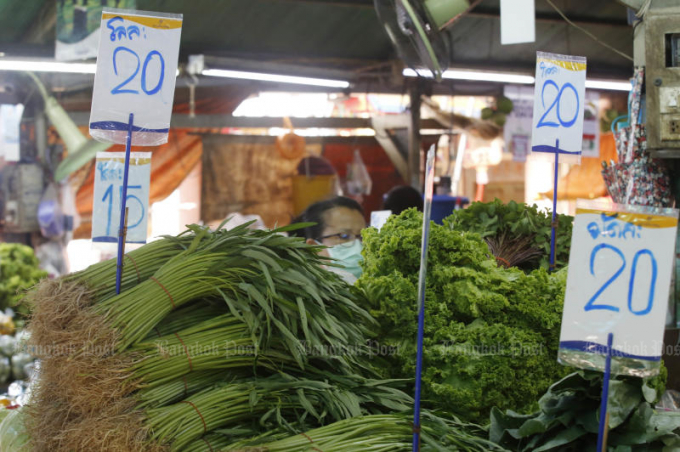November 28, 2025 | 01:23 GMT +7
November 28, 2025 | 01:23 GMT +7
Hotline: 0913.378.918
November 28, 2025 | 01:23 GMT +7
Hotline: 0913.378.918

A vegetable stall in Bang Khen district, Bangkok. Photo: Apichit Jinakul
The move came amid revelations that the average Thai child consumes more than twice the recommended daily intake of sodium per day -- among the highest in the region, researchers said.
Speaking at the recent United Nations' Food Systems Summit Dialogue over Zoom, Renu Garg, a Medical Officer for the World Health Organization (Thailand), raised her concerns over the amount of sodium in an average Thai meal.
The current national nutritional guideline recommends around 600mg of sodium, equivalent to about one-tenth of a teaspoon of salt, per meal.
However, Dr Garg said common street food items such as som tum regularly contain up to 1,800mg of sodium.
Instant cup noodles contain around 1,935mg of sodium per serving, while tom yum goong may contain as much as 2,200mg of salt -- almost four times the recommended amount per serving.
"Eating too much salt is a problem, as it could lead to obesity, diabetes and hypertension -- and the trends are headed in the wrong direction," she said.
"Indeed, NCDs remain the top cause of death in Thailand each year, with as many as 400,000 deaths reported each year, which is equivalent to a death every minute."
On the other hand, she continued, the consumption of fruits and vegetables among Thais remain low.
The WHO recommends an adult to consume around 400g of fruits and vegetables each day, but the average Thai generally consumes less than 250g of greens a day, she said.
The promote a healthier diet among children and adolescents, Dr Garg said all concerned parties must work together to improve lunch offerings at schools nationwide.
One way, she said, is by increasing the serving of fruits and vegetables in school meals, before adding authorities should consider banning or restricting the sale of sugary drinks around school premises.
The government can also adopt stricter regulations on the marketing of unhealthy food and beverages, while at the same time ramping up campaigns to promote healthy diets to the public, she added.
Dr Garg said a combination of subsidies and taxes will encourage manufacturers to reconsider the amount of salt they put in their products, and perhaps incentivise them to incorporate more fruits and vegetables into their product.
Assistant CEO of the Thai Health Promotion Foundation (ThaiHealth), Pairoj Saonuam, said promoting the adequate consumption of fruits and vegetables is relevant to the nation's 13th economic and social development plan and, as such, should be placed higher on the national agenda.
"Food security is the foundation of human security and national security. Sufficient food will bring positive effects to health. Much research worldwide has also emphasised the importance of fruits and vegetables for out health, particularly in preventing NCDs," he said.
(AFP; BKP)

(VAN) A new study reveals how the simultaneous effects of ocean acidification, salinity and loss of oxygen are making the world more fragile.

(VAN) Hopes are growing that the creation of the first 3D turkey gut model could be a turning point in the battle against the virulent blackhead disease.

(VAN) Tyson, America’s biggest meat supplier, plans to shutter one of its largest beef processing plants as the industry continues to struggle with low cattle supplies and political pressure from Washington.

(VAN) New FAO study shows how digital solutions are empowering farmers and fishers to prevent losses and build resilient agrifood systems.

(VAN) Brazil's COP30 presidency pushed through a compromise climate deal on Saturday that would boost finance for poor nations coping with global warming but that omitted any mention of the fossil fuels driving it.

(VAN) Poultry farmers in the UK have been warned that they could face one of the worst winters yet for bird flu.

(VAN) Prices of main-crop paddy have risen sharply, with jasmine rice hitting 16,100 baht per tonne — the highest level in years.